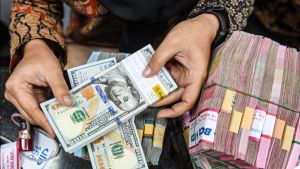JAKARTA - During the COVID-19 pandemic, Micro, Small and Medium Enterprises (MSMEs) were one of the businesses that were affected, and suffered various losses. However, not a few technology companies in the country have also helped revive MSMEs.
One of them is the ride-hailing service, Gojek, which is known to fully support the survival of MSMEs. This was also recognized by the Director General of Domestic Trade, Ministry of Trade of the Republic of Indonesia, Syailendra.
Syailendra also stated that Gojek had supported government programs related to handling the COVID-19 pandemic in Indonesia.
"Currently, we know, Gojek has become an inseparable part of society. The success of Gojek in developing a super app platform, which connects millions of Indonesians, has made Gojek one of the main accelerators for the growth of the digital economy in Indonesia, "said Syailendra at the launch of GoBiz Plus from Gojek and BCA which was held virtually, Tuesday, December 15.
It is known, GoBiz Plus is a versatile tool so that MSMEs can operate more efficiently and support business growth. By partnering with PT Bank Central Asia Tbk (BCA), GoBiz Plus is designed to be able to accept all types of non-cash payments that answer consumer needs.
"BCA implements technology that allows users to choose various payment options. The presence of this collaboration is expected to boost payment efficiency for the creation of a non-cash ecosystem and cashless society," said Director of PT BCA, Santoso Liem.
This is in line with the government's recommendation to minimize direct physical contact by implementing digital payment options.
"GoBiz Plus can be a system that integrates various solutions that can be used by MSME players to be able to solve at least five problems, of course by increasing the business scale," said Syailendra.
On the other hand, the Ministry of Cooperatives and SMEs also identified five problems found by MSMEs in Indonesia during the pandemic, among others, "the decreasing purchasing power of the people due to the pandemic has caused the level of demand for products produced by MSMEs to fall in recent months," he said. Syailendra.
Second, the problem lies in distribution constraints. With the implementation of the PSBB in almost all parts of Indonesia, logistics distribution was also disrupted.
The third problem, related to access to capital or financing, "many UMKM players do not yet have access to capital, so they need assistance to be able to enter and obtain loans from formal financial service institutions provided that the requirements are not too heavy for MSMEs," explained Syailendra.
In the fourth position, there are difficulties in getting raw materials, because of PSBB. Lastly, "the delay in production, due to the inadequate ability of the workforce and production equipment, has an impact on the difficulty of MSME players to meet market needs," concluded Syailendra.
The English, Chinese, Japanese, Arabic, and French versions are automatically generated by the AI. So there may still be inaccuracies in translating, please always see Indonesian as our main language. (system supported by DigitalSiber.id)












